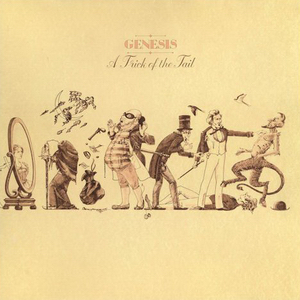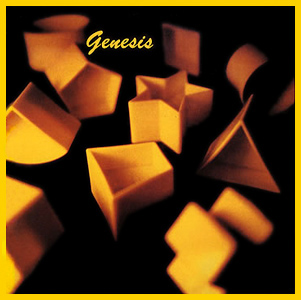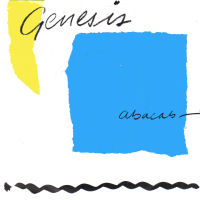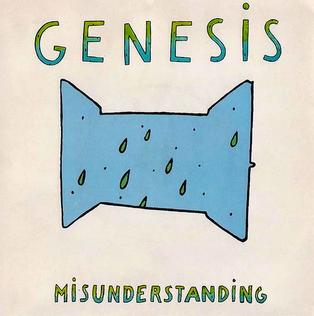
Seconds Out is the second live album by English progressive rock band Genesis. It was released as a double album on 14 October 1977 on Charisma Records and was their last to feature guitarist Steve Hackett prior to his departure. The majority was recorded in June 1977 at the Palais des Sports in Paris during the Wind & Wuthering Tour. One track, "The Cinema Show", was recorded the previous year at the Pavillon de Paris during their A Trick of the Tail Tour.

Invisible Touch is the thirteenth studio album by the English rock band Genesis, released on 6 June 1986 by Atlantic Records in the United States and on 9 June 1986 by Charisma/Virgin Records in the United Kingdom. After taking a break in 1984 for each member to continue their solo career, the band reconvened in October 1985 to write and record Invisible Touch with engineer and producer Hugh Padgham. As with their previous album, it was written entirely through group improvisations and no material developed prior to recording was used.

A Trick of the Tail is the seventh studio album by English progressive rock band Genesis. It was released in February 1976 on Charisma Records and was the first album to feature drummer Phil Collins as lead vocalist following the departure of Peter Gabriel. It was a critical and commercial success in the UK and U.S., reaching No. 3 and No. 31 respectively.

Genesis is the twelfth studio album by English rock band Genesis, released on 3 October 1983 by Charisma and Virgin Records in the UK and by Atlantic Records in the US and Canada. Following the band's tour in support of their 1982 live album Three Sides Live, Genesis took an eight-month break before they regrouped in the spring of 1983 to record a new album. It is their first written and recorded in its entirety at their studio named The Farm in Chiddingfold, Surrey, and the songs were developed through jam sessions in the studio with nothing written beforehand. Hugh Padgham returned as their engineer.

...And Then There Were Three... is the ninth studio album by the English rock band Genesis. It was released in March 1978 by Charisma Records and is their first recorded as a trio of singer/drummer Phil Collins, keyboardist Tony Banks, and bassist/guitarist Mike Rutherford following the departure of guitarist Steve Hackett. The album marked a change in the band's sound, mixing elements of their progressive rock roots with more accessible material, and Collins contributing to more of the group's songwriting.

Duke is the tenth studio album by English rock band Genesis, released in March 1980 on Charisma Records. The album followed a period of inactivity for the band in early 1979. Phil Collins moved to Vancouver, Canada, in an effort to salvage his failing first marriage, while Tony Banks and Mike Rutherford recorded solo albums. Collins returned to the UK after his marriage ended and wrote a significant amount of material, some of which was used for Duke and some was later reworked for his first solo album, Face Value. Duke contained a mix of individually-written songs and tracks that evolved from jam sessions in mid-1979, while recording took place at the end of the year. The break in activity rejuvenated the band, and they found the album an easy one to work on.

Abacab is the eleventh studio album by English rock band Genesis, released on 18 September 1981 by Charisma Records. After their 1980 tour in support of their previous album, Duke (1980), the band took a break before they reconvened in 1981 to write and record a new album. Abacab is the first Genesis album recorded at The Farm, a recording studio bought by the group in Chiddingfold, Surrey. It marked the band's development from their progressive roots into more accessible and pop-oriented songs, and their conscious decision to write songs unlike their previous albums.

"In Too Deep" is the fourth track on the 1986 Genesis album Invisible Touch. It was released as the second single from the LP in the UK and the fifth single in the US. The single was a success in America during the summer of 1987; it reached the No. 3 spot on the US Billboard Hot 100 chart, and the No. 1 spot on the Adult Contemporary chart. The song was only performed live during the 1986 North American legs during the Genesis 1986–87 Invisible Touch world tour. An October 1986 performance of the song was included on the 1992 live album The Shorts.

"Mama" is a song by the English rock band Genesis, released as the first single in 1983 from their self-titled album. It is recognisable for its harsh drum machine introduction composed by Mike Rutherford, which leads into minimalist synthesizer lines in a minor tonality and finally Phil Collins' reverb-laden voice. It remains the band's most successful single in the UK, peaking at No. 4 on the UK Singles Chart. It also made the top 10 in Switzerland, Austria, Norway, Ireland and the Netherlands. It was less popular in the US, only reaching No. 73 on the Billboard Hot 100. A 1992 re-release of the single managed to reach the Top 40 in Germany.

"I Can't Dance" is the fourth track from English rock band Genesis's fourteenth studio album, We Can't Dance (1991), and was released as the second single from the album. The lyrics were written by drummer Phil Collins and the music was written by the whole band. The song peaked at number seven on both the US Billboard Hot 100 and the UK Singles Chart and received a Grammy Award nomination for Best Pop Performance by a Duo or Group With Vocals in 1993. The song also reached number one in Belgium and the Netherlands while peaking within the top five in Austria, Canada, Germany, and Portugal.

"Follow You Follow Me" is a love song written and recorded by English rock band Genesis. It was released in March 1978 as the first single from their ninth studio album, ...And Then There Were Three... (1978). The music was composed by the band, and the lyrics were written by bassist and guitarist Mike Rutherford. The single became Genesis' first top 10 hit in the UK and first top 40 hit in the US, reaching No. 7 and No. 23 respectively.

"That's All" is a song by English rock band Genesis. It is a group composition and appears as the second track on their 1983 album Genesis. It was the album's second single after "Mama". On June 17, 1993, MCA Records re-issued and re-released the song as a CD and "HiQ" cassette single.

"Duchess" is a song by the English rock band Genesis, appearing as the second track on their 1980 album, Duke. It peaked at number 46 in the UK Singles Chart. The song is a part of the album's "hidden suite", which included "Behind the Lines", "Guide Vocal", "Turn It On Again", "Duke's Travels", and "Duke's End". It was the first Genesis song to use a drum machine.

"Keep It Dark" is a song by British band Genesis, released on 23 October 1981 in the UK as the second single from Abacab. It reached number 33 in the UK Singles Chart.

"No Reply at All" is a song by British band Genesis, released as the lead single in the US from their 1981 album Abacab. It was not released in the UK, where "Abacab" was the first single. The US single release edit omits the second verse of the song as it appears on the Abacab album.

"Abacab" is a song by the British rock band Genesis, released on 14 August 1981. It was produced by Genesis and distributed in the United States by Atlantic Records and Warner Music Group. The song, written by Tony Banks, Phil Collins, and Mike Rutherford, was featured on Genesis' album of the same name and was a top 10 hit on the British pop chart, where it peaked at No. 9. The song was the second single from the album in the US, where it peaked at No. 26 on the Billboard Hot 100 chart in early 1982. It stayed in the Top 40 for six weeks.

"Misunderstanding" is a song by English rock band Genesis, released on their 1980 album Duke. It reached No. 14 in the U.S. and No. 42 in the UK. Its highest charting was in Canada, where it reached No. 1 and is ranked as the seventh biggest Canadian hit of 1980. It was also featured on the band's 1982 double-album Three Sides Live, where it led off side three.
"A Trick of the Tail" is a song by the progressive rock band Genesis taken from the 1976 album of the same name. It was written by the band's keyboard player Tony Banks.

"Many Too Many" is a love song recorded by English rock band Genesis.

Three Sides Live is a 1982 concert film featuring the English rock band Genesis. It was released in support of the band's same-titled live double album released in June 1982. Directed by Stuart Orme, the film features live performances from two shows during the band's 1981 tour of Europe and North America in support of their studio album Abacab. The shows are from 28 and 29 November 1981 at the Savoy Theatre and Nassau Coliseum, New York, respectively. The film includes interviews footage shot backstage and the group travelling with the crew and families. Some of the featured songs are incomplete due to editing.



















